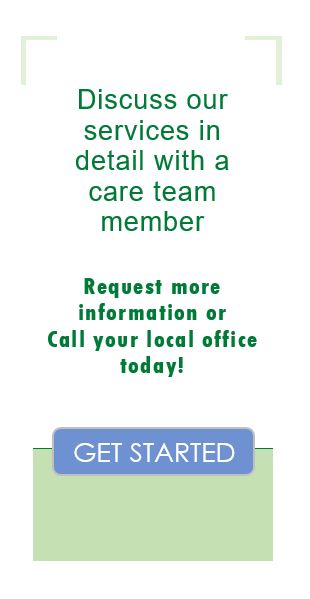Options for Home Care
Relatives or friends
Relatives or friends can make wonderful caretakers and in situations when it works, it is a beautiful solution. If you are considering engaging a relative or friend as a private caregiver though, be sure to think through the many long-term implications and potential pitfalls.
Will this relative’s own personal situation allow them to remain committed and reliably maintain the schedule? Do they have the knowledge, care experience or training necessary to deal with the types of situations that may develop? Are they prepared to perform these duties long term? Are you prepared to give constructive criticism regarding their care should the need arise? If the answer is no to any of these questions, family dynamics may make dealing with the situation difficult. If you are the primary person responsible the care needs will fall back onto you.
Keep in mind elderly and chronically ill persons tend to develop attachments to caregivers. This is especially true of family members. If the family member cannot provide care long term, breaking that connection can be difficult.
Hiring your own Private Caregiver
You could choose to hire your own private caregiver, either part time, full time, or as a live-in where you provide room and board as well as wages in exchange for someone to sleep there nights and weekends. Live-in caretakers hired directly will generally cost less on a per hour basis than hiring the same service through an agency, however there are a number of things to consider.
If you hire a caregiver that is not a relative or friend, you will have to recruit and conduct interviews. You should absolutely run full background checks and check references. These are extremely important steps and for the benefit and safety of your loved one should never be overlooked.
You will want to create regular schedules and be prepared to oversee your loved one’s care personally. Supervision and a second set of eyes is important.
Whether you’ve hired your own homecare aide or working with a member of the family, it’s wise and prudent to anticipate unexpected events and have a plan in place that provides a substitute when the caregiver needs time off, is sick or unable to come to work.
Employer Obligations – Documentation, Taxes, Insurance etc.
If you choose to direct hire someone for in-home care the obligation of having proper immigration documents and working permit is yours as the employer
As a private employer you are required to pay Social Security, unemployment, and payroll taxes. Applicants may represent themselves as independent contractors to relieve the family of these tax paying obligations however, you have the responsibility to be sure the aide truly meets the standards of an independent contractor. In most instances, individual home care aides will not meet the legal criteria as an independent contractor and if the aide has not met his or her tax obligations, this responsibility falls you. This can be a serious obligation because it can involve interest on back taxes, civil fines, and the possibility of criminal penalties.
Overtime wage and hour rules apply to homecare aides, just they do any other employee. A homecare aide (including live in’s) is a non-exempt hourly employee. They must be paid for every hour worked and paid overtime (time and a half) for anything over 40 hours per week in a seven (7) day period. A homecare aide cannot be paid salary.
Also be aware of workman’s compensation. As an employer, the individual or family paying for the private home health aide is generally liable for any work-related injury that occurs on the job. This can include the cost of all medical expenses and any disability payments that might become applicable. Statistically, home care has a higher than average rate for work-related injuries stemming mainly from lifting, transferring, or bathing assistance. . There are also risks related to communicable diseases if the aide does not abide by universal precautions required by all licensed agency personnel.
As an employer you also may have liability for any injury to others caused by an employee. If the home health aide were to cause an accident, for example, in which others suffered any harm or losses, the employer (you) bear the responsibility for all costs and compensation.
If you are considering hiring a private care aide directly, you should seek the advice of your attorney and insurance agent to be sure you are properly protected from these risks.
A Professional Home Care Agency
If you prefer to avoid the time consuming and often frustrating process of hiring and overseeing a caregiver yourself, a well-established home care agency is a good option.
By providing you quality, professionally trained care staff people who possess the necessary knowledge and certifications to perform this work well, you and your family can rest easier knowing your loved one is safe and well care for while you can avoid all the challenges and complications of being an employer yourself.
Qualified agencies following HCAA guidelines conduct extensive screening when hiring aide candidates. Screenings include criminal background checks, elder abuse and sex offender screens, credential verifications, motor vehicle record check, communicable disease screening, reference checks and interview.
Aides receive training on the agencies policies & procedures, standard precautions on infection control, confidentiality and security, signs of abuse, basic body mechanics, safety and emergency response.
As mentioned previously, when hiring an agency, a licensed nurse should complete a thorough in-home assessment and understand your needs and desires. Once that is completed the agencies staffing team will promptly find you a caregiver that is a good match for your situation and the care service can usually begin within a couple days, if not sooner.
Schedulers/care coordinators monitor all appointment schedules daily and will generally do their absolute best to assure you are not left having to suddenly deal with a missing care aide.
You will want to know that your agency aide carries a mobile device at all times to report in, out and instantly communicate with their local office in the event of a sudden development or emergency. In these events the local office staff can bring the necessary resources together to provide guidance and assistance to properly handle any situation that develops.






